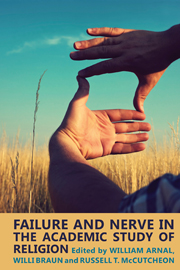Book contents
- Frontmatter
- Content
- Preface
- Acknowledgments
- Contributors
- Epigraph
- The Nerve of Donald Wiebe
- The Failure of Nerve in the Academic Study of Religion
- General Failures
- Special Failures
- Failures (of Nerve?) in the Study of Islamic Origins
- The Failure of Islamic Studies Post-9/11: A Contextualization and Analysis
- Religious Studies that Really Schmecks: Introducing Food to the Academic Study of Religion
- Cultural Anthropology and Corinthian Food Fights: Structure and History in the Lord's Dinner
- The Identity of Q in the First Century: Reproducing a Theological Narrative
- The Failure of Nerve to Recognize Violence in Early Christianity: The Case of the Parable of the Assassin
- Redescribing Iconoclasm: Holey Frescoes and Identity Formation
- In Lieu of Conclusion
- Index of Authors
Failures (of Nerve?) in the Study of Islamic Origins
from Special Failures
- Frontmatter
- Content
- Preface
- Acknowledgments
- Contributors
- Epigraph
- The Nerve of Donald Wiebe
- The Failure of Nerve in the Academic Study of Religion
- General Failures
- Special Failures
- Failures (of Nerve?) in the Study of Islamic Origins
- The Failure of Islamic Studies Post-9/11: A Contextualization and Analysis
- Religious Studies that Really Schmecks: Introducing Food to the Academic Study of Religion
- Cultural Anthropology and Corinthian Food Fights: Structure and History in the Lord's Dinner
- The Identity of Q in the First Century: Reproducing a Theological Narrative
- The Failure of Nerve to Recognize Violence in Early Christianity: The Case of the Parable of the Assassin
- Redescribing Iconoclasm: Holey Frescoes and Identity Formation
- In Lieu of Conclusion
- Index of Authors
Summary
I would like to ask a more specific question than the one asked by Don Wiebe (1984) at the beginning of his essay, “The Failure of Nerve in the Academic Study of Religion.” Does Islamic theology jeopardize the existence of the academic study of Islam, and even more specifically, the study of Islamic origins? At first glance, this question will strike almost all scholars of Islam as odd at best. Many scholars of Islam are neither Muslims nor former Muslims. Therefore, few of these scholars feel bound by Muslim confessional claims, nor are they subject to a hegemonic Muslim culture that might circumscribe their inquiries. Were one to ask, as Wiebe does for the study of religion in general, whether the scholar-scientist or the scholardevotee controls the agenda for such a study, the scholar of Islam would again see the question as odd. Obviously the scholar-devotees of al-Azhar in Egypt or of Qom in Iran do not control the study of Islamic origins in the West.
There seems little doubt that such questions are more apropos in the study of Christian origins in which Christian theology and Christian scholars are so pervasive. Many scholars of the historical Jesus seem bound by theological constraints or have theological agendas, such as creating an image of Jesus that would still allow Christians to be followers of Jesus (Mack 2003: 38; Berg and Rollens 2008: 279).
- Type
- Chapter
- Information
- Failure and Nerve in the Academic Study of Religion , pp. 112 - 128Publisher: Acumen PublishingPrint publication year: 2012



